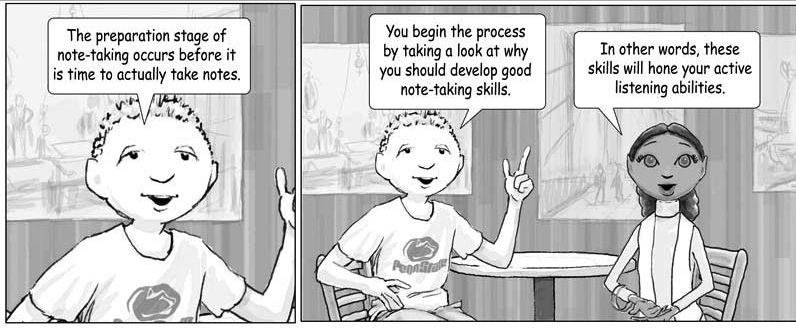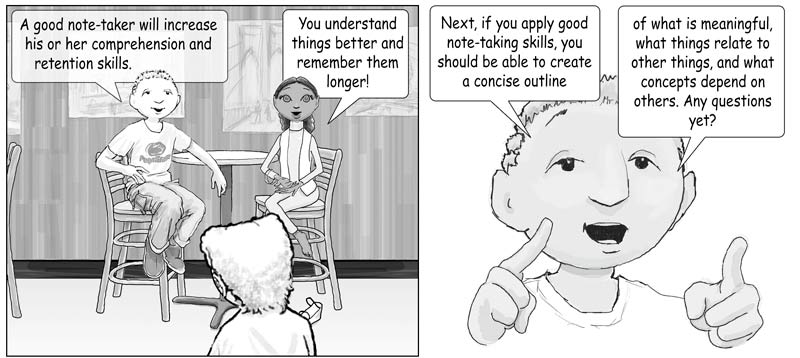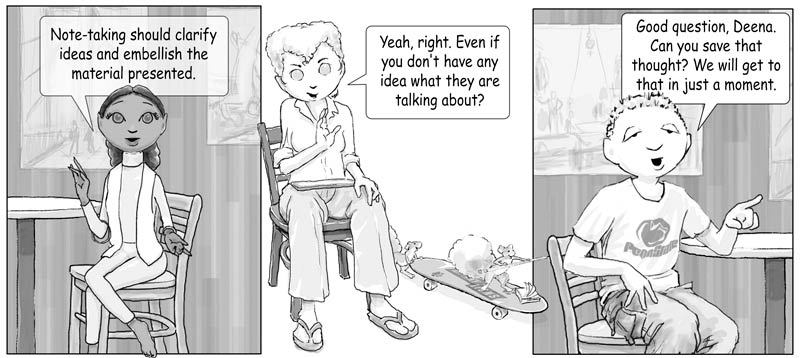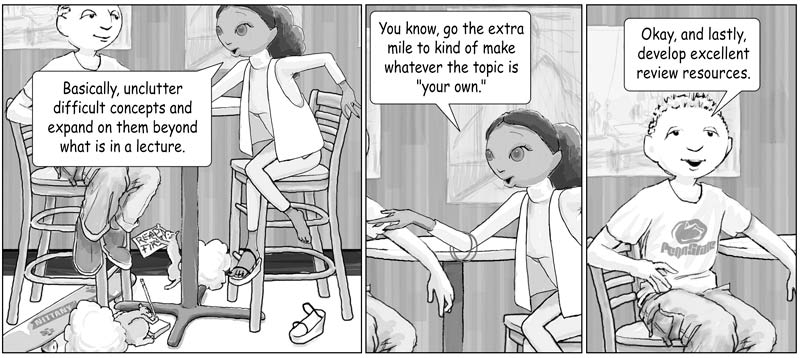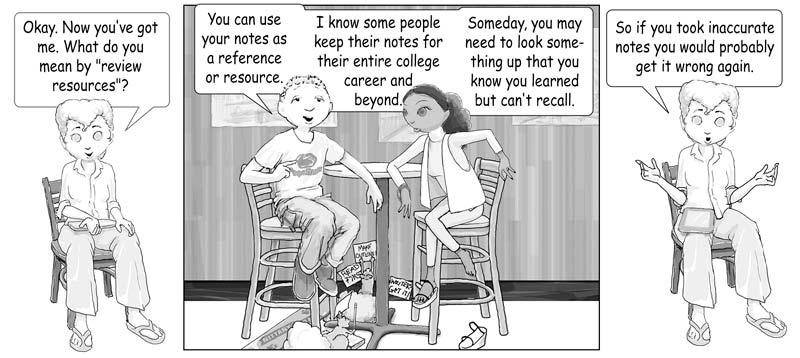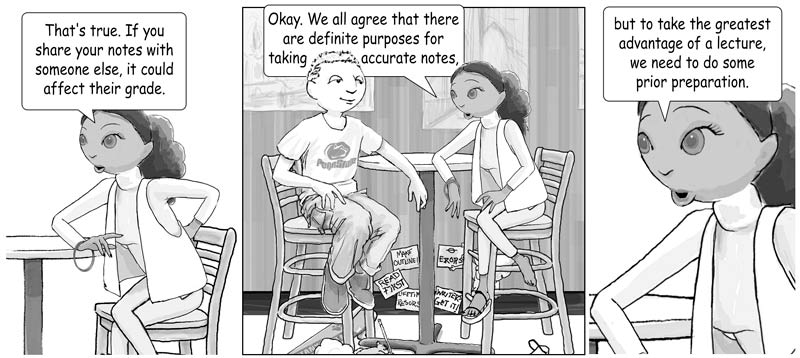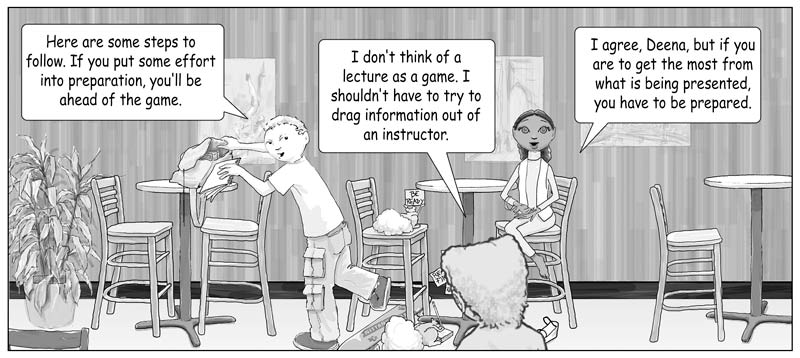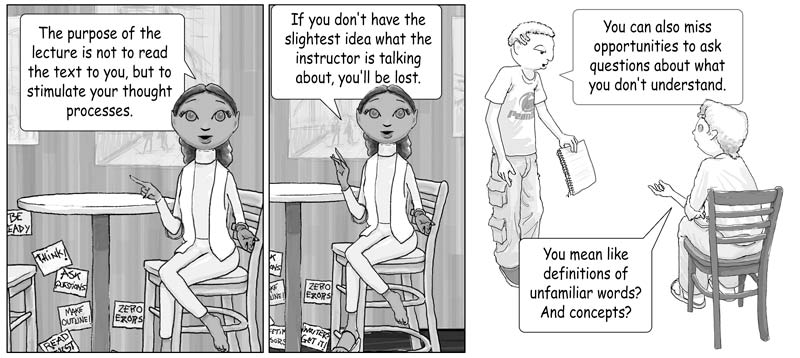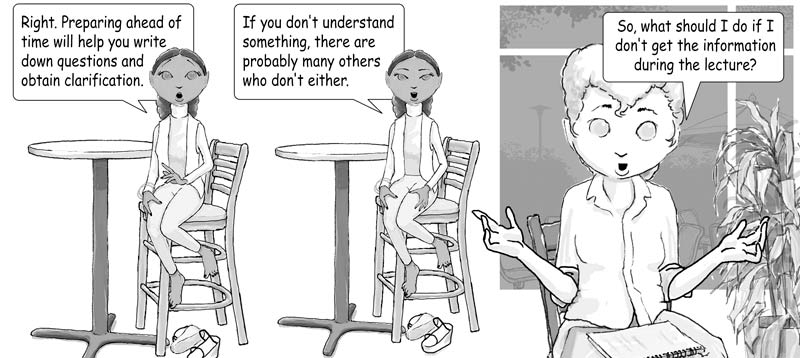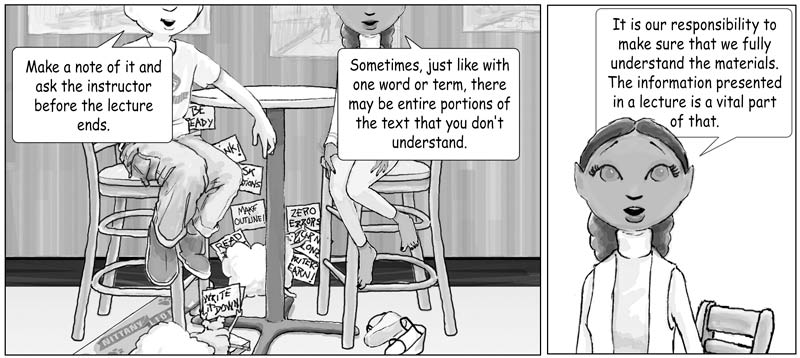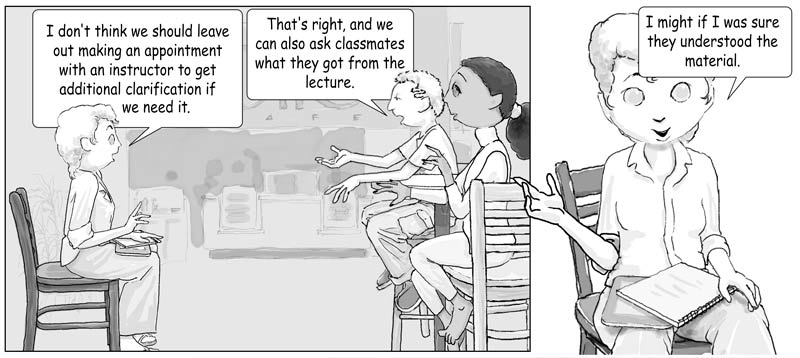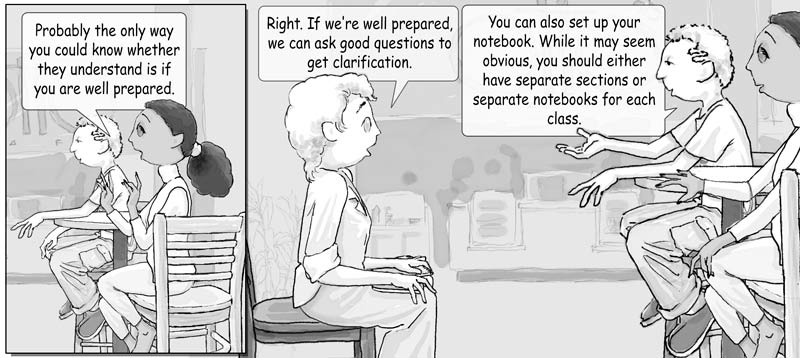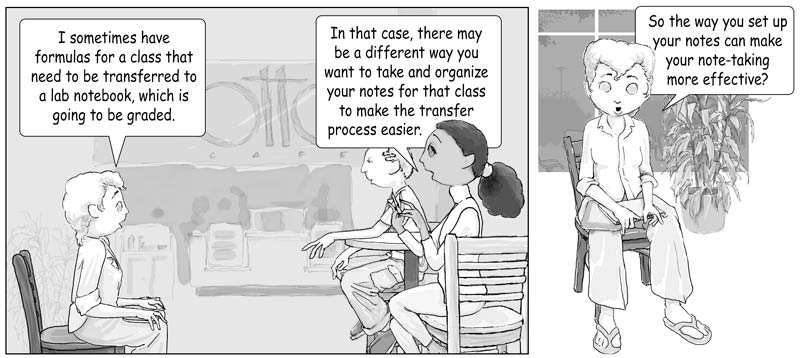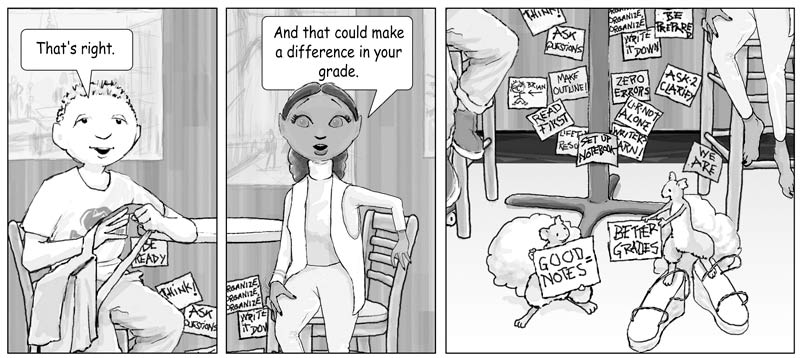Preparing for Taking Notes
Student Dialog - Taking Notes
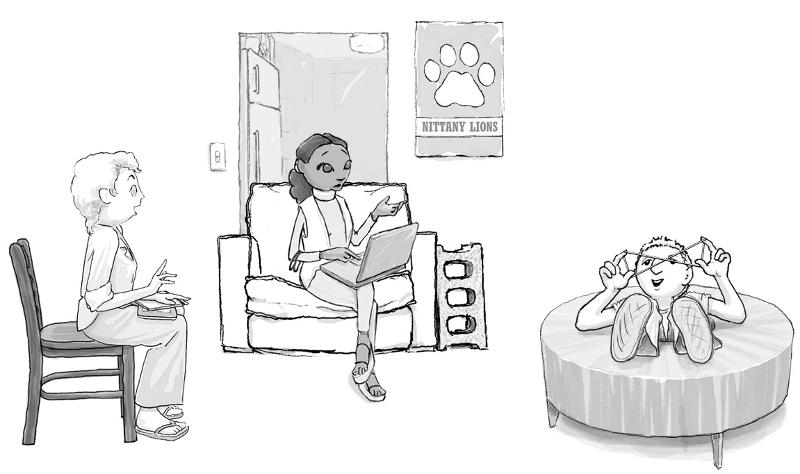 Deena: I just returned from a class where I could hardly follow what the instructor was trying to teach us.
Deena: I just returned from a class where I could hardly follow what the instructor was trying to teach us.
Brian: I know what you mean. All five of my instructors teach in different ways. Some are very organized, while others wander all over the place.
Heather: Wander! Sometimes I think they're actually lost.
Deena: This one professor I have likes to tell stories, but he leaves it up to us to figure out which stories are important to remember.
Brian: The point is that because all of our instructors use different styles when they lecture, it is important to figure out what style they are using so we can take good notes.
Deena: I think we all could improve our note-taking skills.
Brian: Learning to take good and accurate notes should help with our data collection assignment.
Deena: Well then, who wants to gather up some information about note-taking and bring it back to share with us?
Brian: I guess I could do it.
Heather: I can work on it too. So, Brian, when do you want to meet to brainstorm and develop our sharing strategy? I have a class coming up.
Brian: That's fine. I'm going to the learning resource center. Maybe I can pick up some material there while I wait for you.
Heather: Sounds good.
Brian: See you later in the student lounge.
(Brian and Heather meet at the student lounge.)
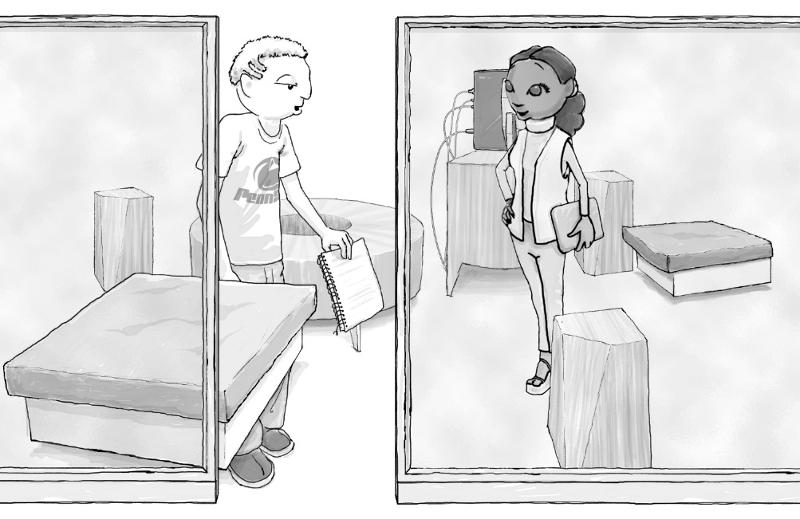 Heather: Hi, Brian. So what did you find out?
Heather: Hi, Brian. So what did you find out?
Brian: I didn't spend a lot of time researching note-taking, but I did ask a teaching assistant. He said that there are three different stages of a lecture to consider: before lecture preparation, activities during the lecture, and post-lecture debriefing.
Heather: That sounds like a good start, why don't we use those?
Brian: How about I take "preparing before the lecture" and "activities during the lecture." You take "activities during the lecture" and "post-lecture debriefing."
Heather: So we both get to do "activities during the lecture." We can tie that together later.
Brian: How do you want to present it?
Heather: I like to use graphics or visuals to make my ideas clear. So I guess we could use some presentation software and display information on a video screen.
Brian: Great.
Prior to Attending Class
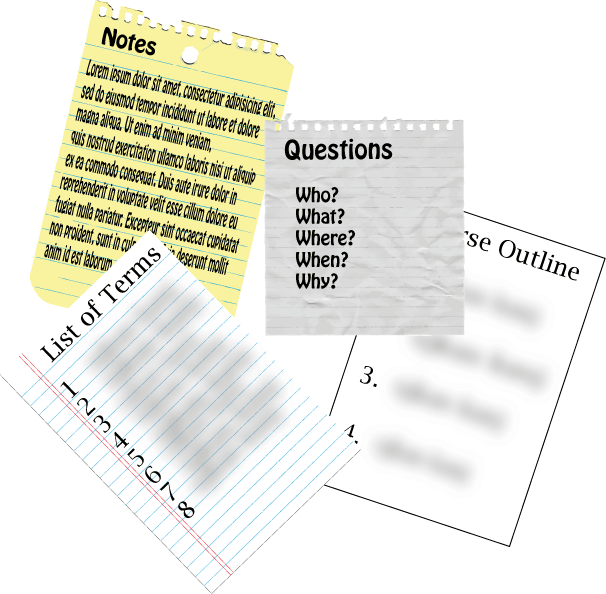 Being prepared for class includes completing assignments as well as looking ahead at what will be covered in the next class. Following are some tips for what to do to prepare for class and what to do during class:
Being prepared for class includes completing assignments as well as looking ahead at what will be covered in the next class. Following are some tips for what to do to prepare for class and what to do during class:
- Preview your text or reading assignments prior to lecture—use active reading skills. Previewing allows you to identify main ideas and concepts that will most likely be presented during the lecture.
- Read over your notes from the previous class.
- Look at the course outline to see where you've been, where you're going, and how it all fits together.
- Meet with your instructor/TA to clarify concepts from the last lecture.
- Obtain notes from any class session you've missed.
- List unfamiliar terms and concepts prior to the lecture. Compose a simple definition for unfamiliar terms prior to the lecture. This gives you a general understanding of the material that will be presented in class.
- Compose clear questions you can ask about terms or concepts you don't understand. You might request clarification from fellow students prior to the lecture. If you are still uncertain, ask for clarification during the lecture. If a term or concept has not been clarified during the lecture, ask the instructor before the class period ends.
- Note portions of the text or reading assignment that you do not understand, as you did with terms and definitions. Listen for explanations during class. Prepare a question to ask during class if you are still confused.
During Class
- Mark each set of notes with a date and title and keep notes from different classes separate.
- Sit where you can hear and see clearly without distractions.
- Don't crowd your notes! Leave blanks to fill in missed items and to expand upon your notes later.
- Ask your instructor, TA, or classmates to help you fill in the gaps if you think you missed one or two important points.
- Stay involved in the class and ask questions. Volunteer for demonstrations. Join in class discussions.
- Take too many notes, rather than not enough. You can always omit unnecessary information later.
- Think to yourself, "Why is this important?"
- Focus on the point the professor is making, rather than scrambling to copy the entire overhead without listening to what the professor is saying.
- Write down notes in your own words when possible and think about what the professor is saying. However, definitions of technical terms should be recorded exactly as given.
- Use abbreviations and symbols to save time. Make sure you understand your abbreviations.
- Take notes in different colors to highlight important points.
- Use underlining or symbols, such as an asterisk or star, to identify points your instructor emphasizes.
- Stay alert for and highlight points your instructor emphasizes through his or her verbal cues. Watch for lists such as "the following five steps" or "the four major causes" and for summaries signaled by words such as "consequently" or "therefore."
- Add examples your professor provides in order to clarify abstract ideas and to jog your memory when studying later.
- Don't be a clock-watcher. Instructors do not always pace themselves accurately and may cram half of the lecture into the last fifteen minutes.
- Learn as much as you can in class because this will help you to better understand and complete outside assignments.
- Use a recorder only to clarify lecture points—use the counter to make referencing the recording easier.
- Meet a conscientious and success-oriented student in each class at the beginning of every semester and share notes.
Student Dialog - More on Taking Notes
(At the next group meeting, Brian and Heather tell Deena what they learned about note-taking.)
Brian: The preparation stage of note-taking occurs before it is time to actually take notes. You begin the process by taking a look at why you should develop good note-taking skills.
Heather: In other words, these skills will hone your active listening abilities.
Brian: A good note-taker will increase his or her comprehension and retention skills.
Heather: You understand things better and remember them longer!
Brian: Next, if you apply good note-taking skills, you should be able to create a concise outline of what is meaningful, what things relate to other things, and what concepts depend on others. Any questions yet?
Heather: Note-taking should clarify ideas and embellish the material presented.
Deena: Yeah, right. Even if you don't have any idea what they are talking about?
Brian: Good question, Deena. Can you save that thought? We will get to that in just a moment.
Heather: Basically, unclutter difficult concepts and expand on them beyond what is in a lecture. You know, go the extra mile to kind of make whatever the topic is "your own."
Brian: Okay, and lastly, develop excellent review resources.
Deena: Okay. Now you've got me. What do you mean by "review resources"?
Brian: You can use your notes as a reference or resource. I know some people keep their notes for their entire college career and beyond. Someday, you may need to look something up that you know you learned but can't recall.
Deena: So if you took inaccurate notes you would probably get it wrong again.
Heather: That's true. If you share your notes with someone else, it could affect their grade. Okay. We all agree that there are definite purposes for taking accurate notes, but to take the greatest advantage of a lecture, we need to do some prior preparation.
Brian: Here are some steps to follow. If you put some effort into preparation, you'll be ahead of the game.
Deena: I don't think of a lecture as a game. I shouldn't have to try to drag information out of an instructor.
Heather: I agree, Deena, but if you are to get the most from what is being presented, you have to be prepared. The purpose of the lecture is not to read the text to you, but to stimulate your thought processes. If you don't have the slightest idea what the instructor is talking about, you'll be lost.
Brian: You can also miss opportunities to ask questions about what you don't understand.
Deena: You mean like definitions of unfamiliar words? And concepts?
Heather: Right. Preparing ahead of time will help you write down questions and obtain clarification. If you don't understand something, there are probably many others who don't either.
Deena: So, what should I do if I don't get the information during the lecture?
Brian: Make a note of it and ask the instructor before the lecture ends.
Heather: Sometimes, just like with one word or term, there may be entire portions of the text that you don't understand. It is our responsibility to make sure that we fully understand the materials. The information presented in a lecture is a vital part of that.
Deena: I don't think we should leave out making an appointment with an instructor to get additional clarification if we need it.
Brian: That's right, and we can also ask classmates what they got from the lecture.
Deena: I might if I was sure they understood the material.
Heather: Probably the only way you could know whether they understand is if you are well prepared.
Deena: Right. If we're well prepared, we can ask good questions to get clarification.
Brian: You can also set up your notebook. While it may seem obvious, you should either have separate sections or separate notebooks for each class.
Deena: I sometimes have formulas for a class that need to be transferred to a lab notebook, which is going to be graded.
Heather: In that case, there may be a different way you want to take and organize your notes for that class to make the transfer process easier.
Deena: So the way you set up your notes can make your note-taking more effective?
Brian: That's right.
Heather: And that could make a difference in your grade.
